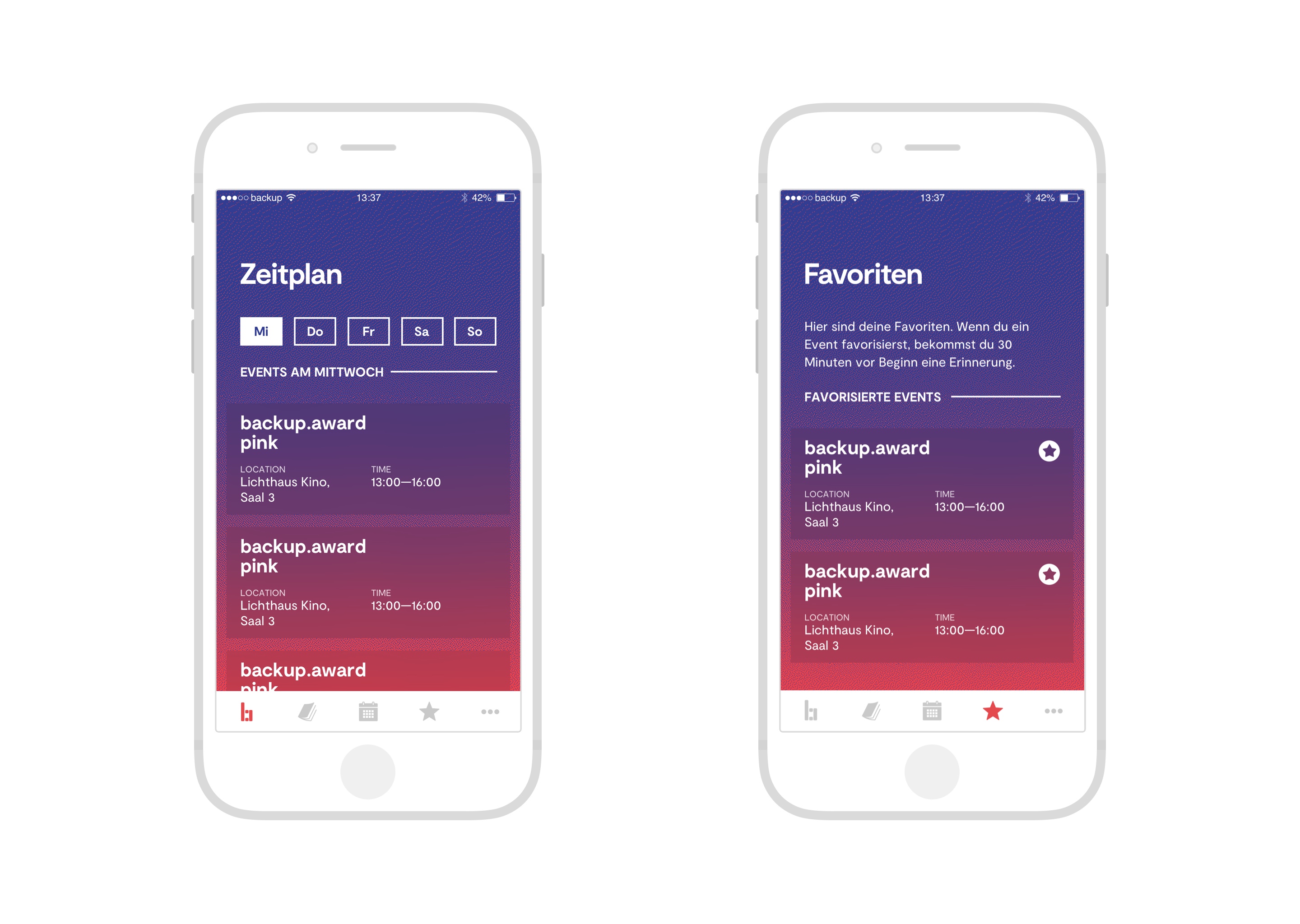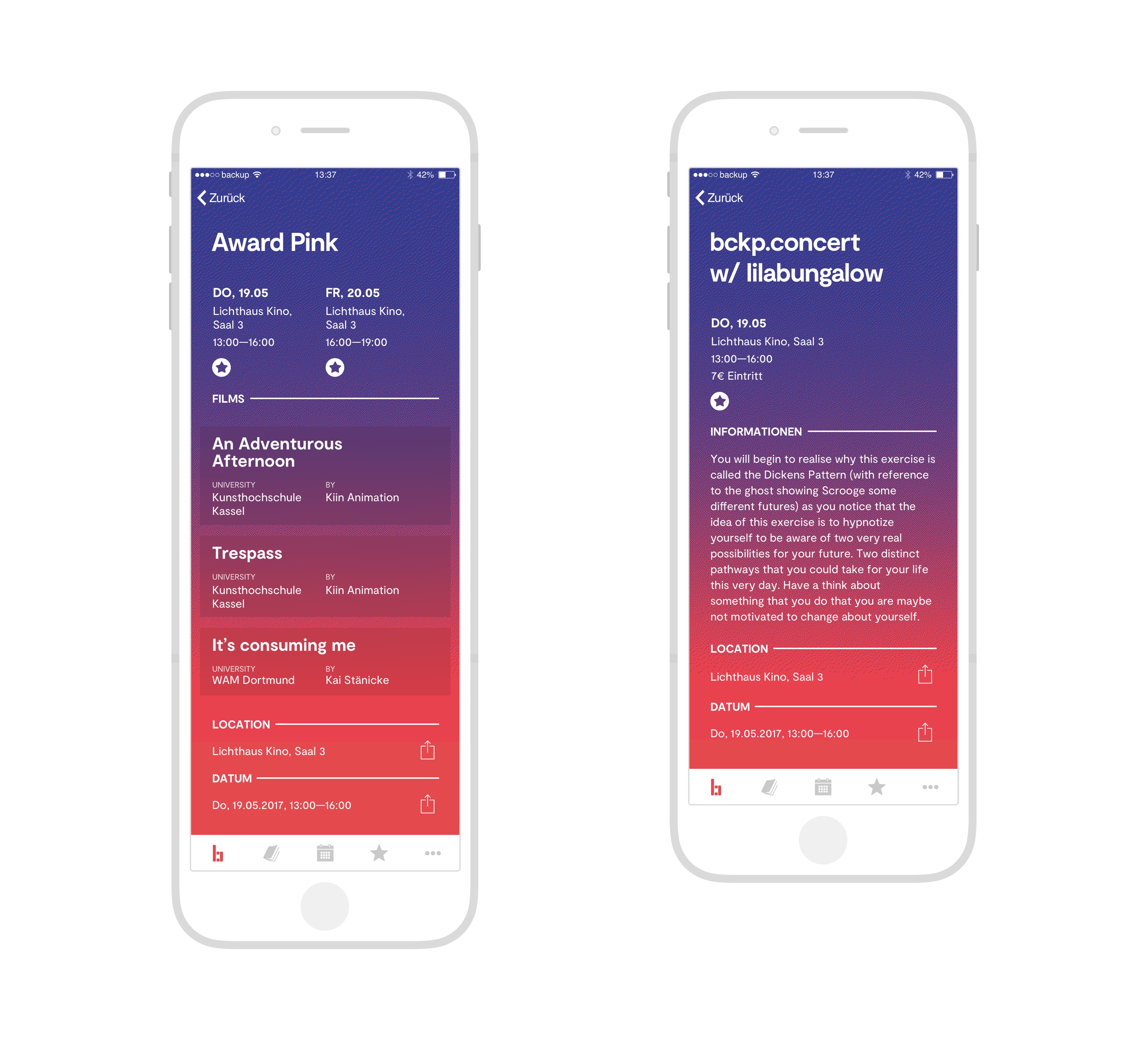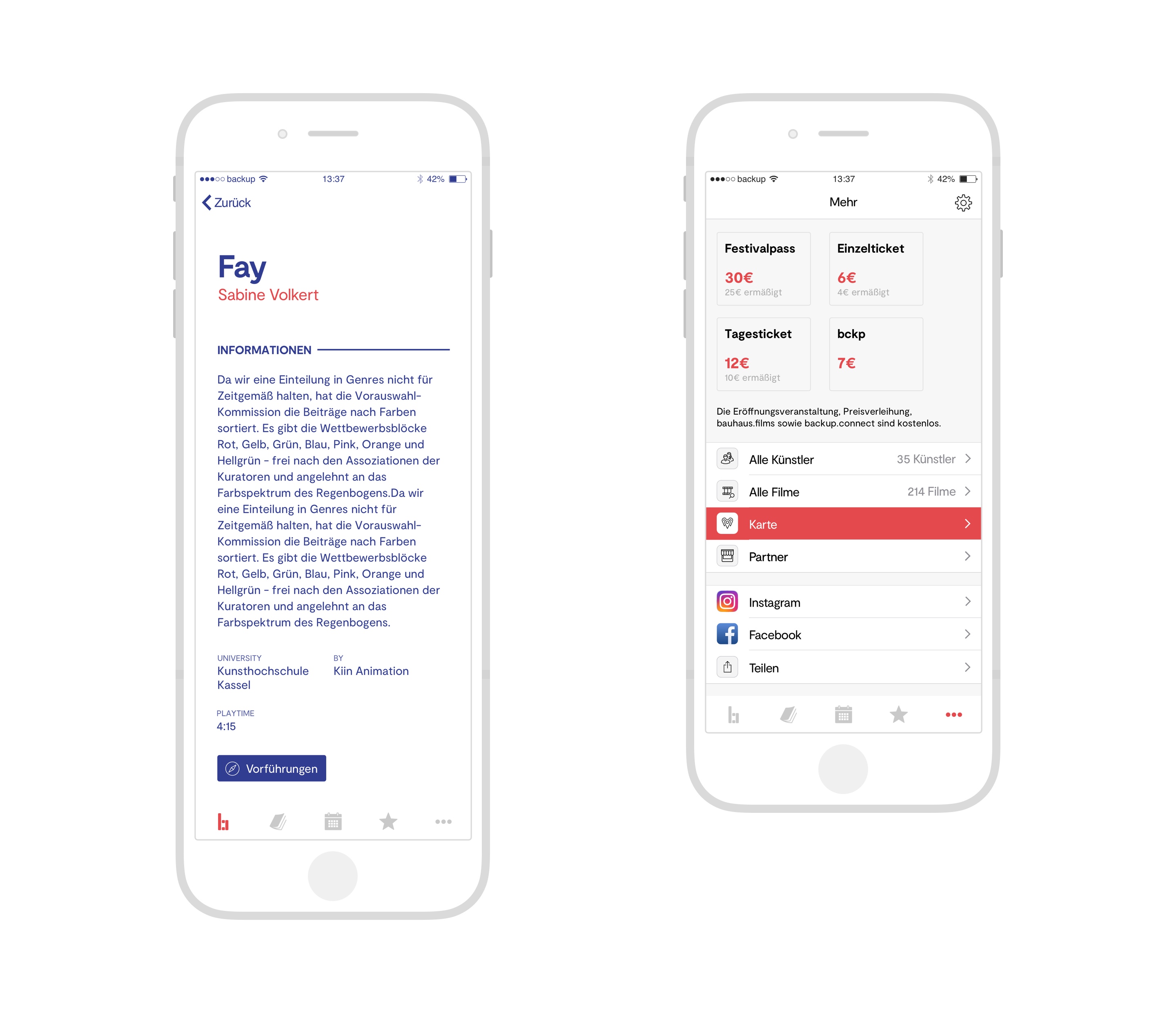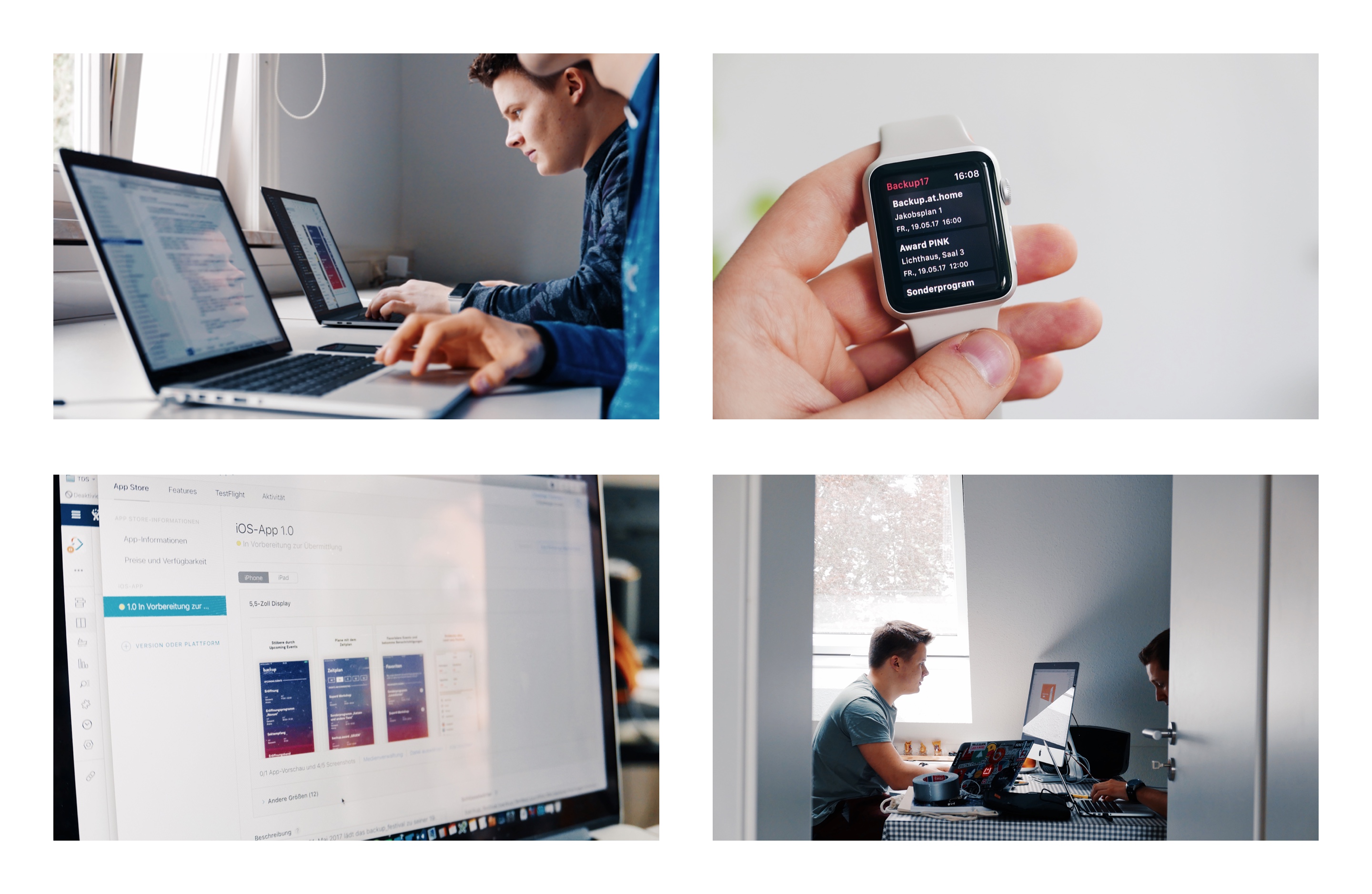backup_festival Apps
Bauhaus-University Weimar — 2016-2018 · Design
Introduction
backup_festival is a film and media arts festival in Weimar. It intends to support new talent, new cinematic perspectives and modern techniques in storytelling.
The festival is twenty years old (2019) and has a deep heritage with the Bauhaus-University as well as Weimars creative culture. Since its very first festival year in 1999, it was organized by students of the university. The festival is embedded in the teaching of my study program and can be attended to as a regular module.
The backup_festival apps were a major part of my studies as I've attended its course for four consecutive semesters. This has two reasons: a) the festival takes place once a year, so in order to design, build and ship the app, one would need to take both the winter as well as the summer courses naturally; b) the process of shipping an app and starting from scratch is so time consuming (mostly because we all were so inexperienced, but that is kind of the idea of studying).
The festival is twenty years old (2019) and has a deep heritage with the Bauhaus-University as well as Weimars creative culture. Since its very first festival year in 1999, it was organized by students of the university.
Context and Role
The backup_festival team usually consists of around 100 students supervised by three teachers which coordinated the teams. The team is split into different departments, like finance, marketing, artists-relations, curation etc. One of those teams was the web team, which I joined immediately. The web team consisted of only a handful of people, some with lots of experience, some with less. With my interest for app projects growing, the first thing I did in the kickoff/ideation workshop was suggesting an app for the festival.
So in close cooperation with the people working on the website I worked on app concepts knowing that the app would be dependent on the website and its database. Later, the team was accompanied with a UX researcher. Sadly we didn't have any developers in the team, but we figured that out later as well. Throughout the four semesters I was responsible for the mobile app and its design.

Ideation and Concept
The backup_festival team setup inspires people to ultimately decide what and how they want to work on their teams issues. So for the web/app team, nobody told us what features or requirements we'd have to cover. The first meetings were thinking features and ways a festival app could be useful to its visitors. In the end we went with a boiled-down feature set containing the catalogue and an overview of the venues, of which there were many.
The catalogue was especially useful because the print version was a pretty heavy and thick book which also cost 5€ extra because the printing was so expensive. Replacing it with a digital version seemed feasible as the website already contained that information. Later, we also added favorite events and a 'today' screen, giving visitors a nice overview of events and screenings that are coming up in the following hours.
Design and Aesthetic
The design and aesthetic of the app needed to integrate seamlessly into the other mediums like web or print. To achieve a look that every department was happy to work with, the creative teams worked together to realize something like a rough visual identity. That identity was intentionally very loose, just so that print and digital departments could work with it according to the limitations their mediums brought with them.
backup_festival is a festival for film and media art. The approaches of films and storytellers whose work was shown during the festival are oftentimes quite experimental and highly stylized. With respect to that, I wanted to work this identity and creative vibe into the design. The app also resembled the digital version of the printed catalogue that existed, so we took magazine-style visual cues from there as well.



Development and Rollout
I worked with Stefan Hürdler, a CS student who did his mandatory internship at the festival. In 2017, we were a team of two and thought we could deliver iOS as well as Android in parallel just in time for the festival, which was pretty much shooting for the moon. By the time the festival took place, we had barely managed to get the Android app out the door. The fact that we didn't make it in time was up to two reasons: a) API preparation by the web-team and b) our skillset.
Due to the app being a catalogue for the most part, we were highly-dependent on the API-data from the website which blocked development for weeks.
Things like sprints, requirements and all of the things that would prevent this were basically uncharted territory for us. Of course our experience of zero apps shipped also impacted the development and rollout process. We ran into every pitfall: backwards compatibility, small screens, networking states, store upload preparations etc.
In 2018, the team was me and Zhu, a media architecture student who helped with UX research. At that time, I was already working for TDSoftware and managed to win over an iOS developer to help with the development. Long story short, in the end we had a very nice iOS version but no Android (due to the lack of an Android developer).

Personal Notes
The backup_festival group dynamic and process is something that to this day makes the project stand out to me. I remember complaining over the lack of mentors that could help us. Looking back I realize we made it without any mentors because each of us wanted to have the app live for the festival start. Over the semesters we almost grew an entrepreneurial motivation on the project. We had an Apple Watch App, an iMessage sticker pack and a landing page. Nobody asked for any of those things, but we built it because we wanted it.
We were by no means professional and at times didn't know what we were doing. We didn't deliver half of what we said we would. But we did deliver something. We learned so much from the process that nothing else mattered. I wanted to add this project to my portfolio because it's most probably the steepest learning curve I have experienced.
↑ Go back up
backup_festival Apps
Bauhaus-University Weimar — 2016-2018 · Design
Introduction
backup_festival is a film and media arts festival in Weimar. It intends to support new talent, new cinematic perspectives and modern techniques in storytelling.
The festival is twenty years old (2019) and has a deep heritage with the Bauhaus-University as well as Weimars creative culture. Since its very first festival year in 1999, it was organized by students of the university. The festival is embedded in the teaching of my study program and can be attended to as a regular module.
The backup_festival apps were a major part of my studies as I've attended its course for four consecutive semesters. This has two reasons: a) the festival takes place once a year, so in order to design, build and ship the app, one would need to take both the winter as well as the summer courses naturally; b) the process of shipping an app and starting from scratch is so time consuming (mostly because we all were so inexperienced, but that is kind of the idea of studying).
The festival is twenty years old (2019) and has a deep heritage with the Bauhaus-University as well as Weimars creative culture. Since its very first festival year in 1999, it was organized by students of the university.
Context and Role
The backup_festival team usually consists of around 100 students supervised by three teachers which coordinated the teams. The team is split into different departments, like finance, marketing, artists-relations, curation etc. One of those teams was the web team, which I joined immediately. The web team consisted of only a handful of people, some with lots of experience, some with less. With my interest for app projects growing, the first thing I did in the kickoff/ideation workshop was suggesting an app for the festival.
So in close cooperation with the people working on the website I worked on app concepts knowing that the app would be dependent on the website and its database. Later, the team was accompanied with a UX researcher. Sadly we didn't have any developers in the team, but we figured that out later as well. Throughout the four semesters I was responsible for the mobile app and its design.

Ideation and Concept
The backup_festival team setup inspires people to ultimately decide what and how they want to work on their teams issues. So for the web/app team, nobody told us what features or requirements we'd have to cover. The first meetings were thinking features and ways a festival app could be useful to its visitors. In the end we went with a boiled-down feature set containing the catalogue and an overview of the venues, of which there were many.
The catalogue was especially useful because the print version was a pretty heavy and thick book which also cost 5€ extra because the printing was so expensive. Replacing it with a digital version seemed feasible as the website already contained that information. Later, we also added favorite events and a 'today' screen, giving visitors a nice overview of events and screenings that are coming up in the following hours.
Design and Aesthetic
The design and aesthetic of the app needed to integrate seamlessly into the other mediums like web or print. To achieve a look that every department was happy to work with, the creative teams worked together to realize something like a rough visual identity. That identity was intentionally very loose, just so that print and digital departments could work with it according to the limitations their mediums brought with them.
backup_festival is a festival for film and media art. The approaches of films and storytellers whose work was shown during the festival are oftentimes quite experimental and highly stylized. With respect to that, I wanted to work this identity and creative vibe into the design. The app also resembled the digital version of the printed catalogue that existed, so we took magazine-style visual cues from there as well.



Development and Rollout
I worked with Stefan Hürdler, a CS student who did his mandatory internship at the festival. In 2017, we were a team of two and thought we could deliver iOS as well as Android in parallel just in time for the festival, which was pretty much shooting for the moon. By the time the festival took place, we had barely managed to get the Android app out the door. The fact that we didn't make it in time was up to two reasons: a) API preparation by the web-team and b) our skillset.
Due to the app being a catalogue for the most part, we were highly-dependent on the API-data from the website which blocked development for weeks.
Things like sprints, requirements and all of the things that would prevent this were basically uncharted territory for us. Of course our experience of zero apps shipped also impacted the development and rollout process. We ran into every pitfall: backwards compatibility, small screens, networking states, store upload preparations etc.
In 2018, the team was me and Zhu, a media architecture student who helped with UX research. At that time, I was already working for TDSoftware and managed to win over an iOS developer to help with the development. Long story short, in the end we had a very nice iOS version but no Android (due to the lack of an Android developer).

Personal Notes
The backup_festival group dynamic and process is something that to this day makes the project stand out to me. I remember complaining over the lack of mentors that could help us. Looking back I realize we made it without any mentors because each of us wanted to have the app live for the festival start. Over the semesters we almost grew an entrepreneurial motivation on the project. We had an Apple Watch App, an iMessage sticker pack and a landing page. Nobody asked for any of those things, but we built it because we wanted it.
We were by no means professional and at times didn't know what we were doing. We didn't deliver half of what we said we would. But we did deliver something. We learned so much from the process that nothing else mattered. I wanted to add this project to my portfolio because it's most probably the steepest learning curve I have experienced.
↑ Go back up